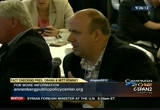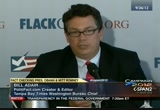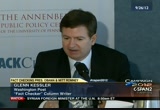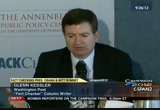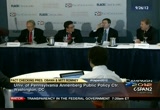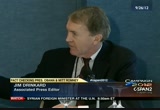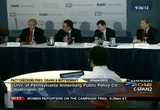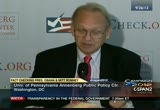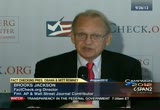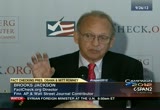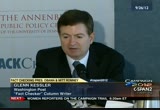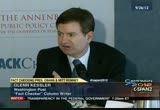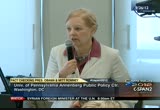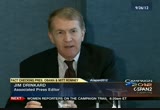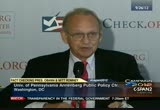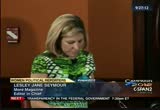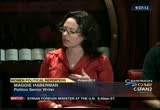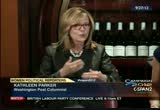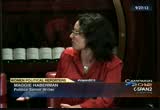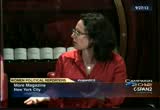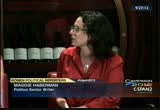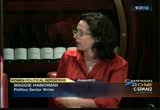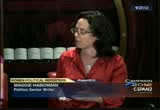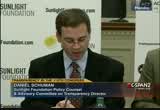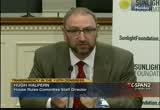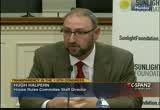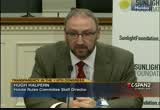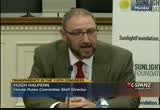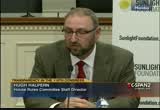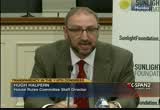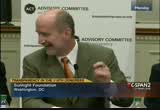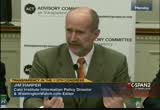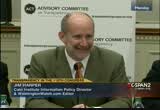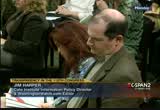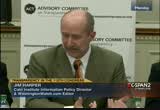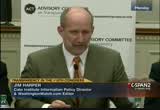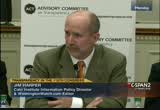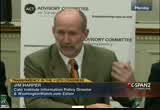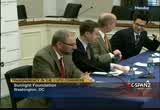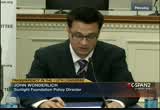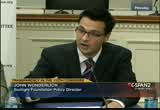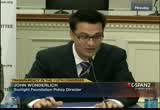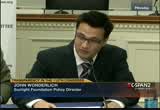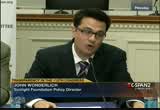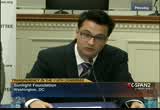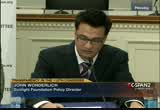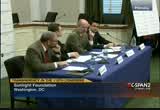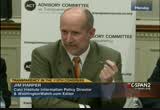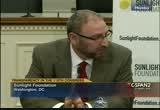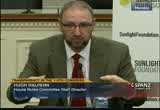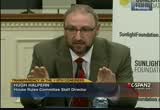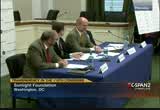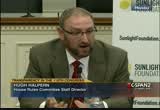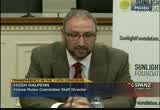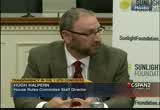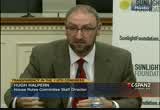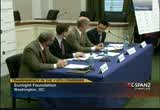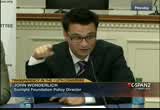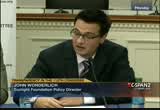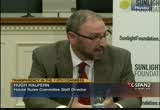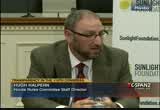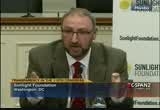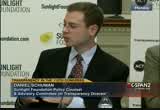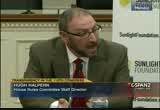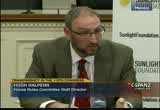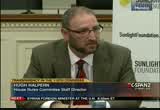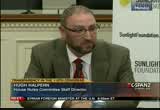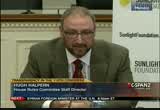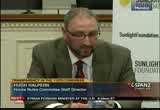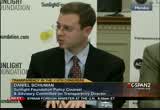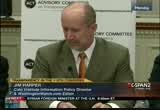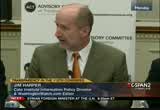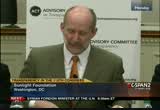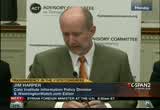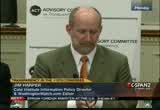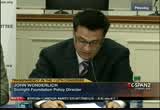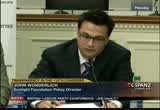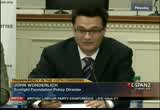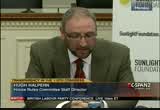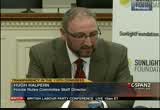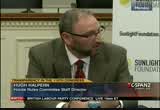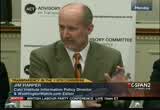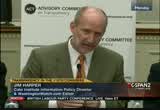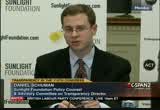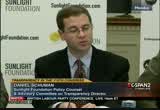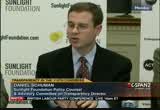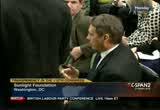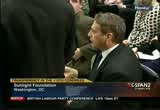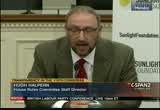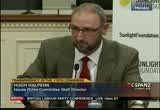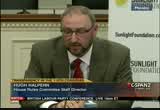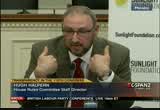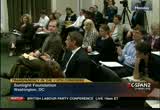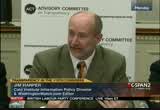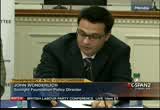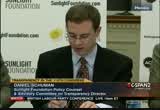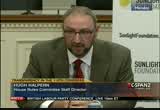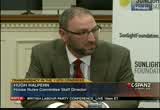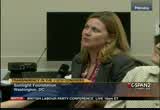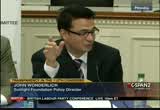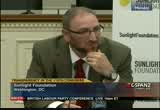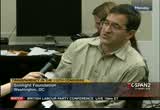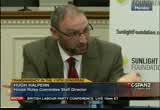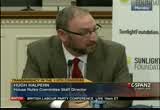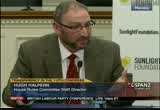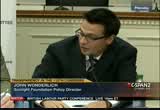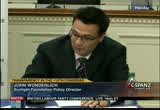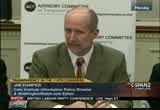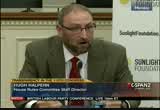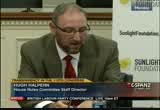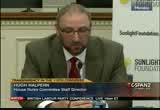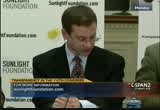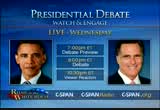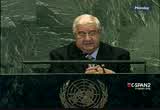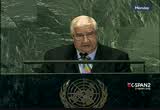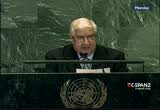tv Today in Washington CSPAN October 2, 2012 6:00am-9:00am EDT
6:59 am
>> all of us get the point. we all talk to people every day. when you hear an authentic answer like -- it's like not talking what, i don't know what to do with that. you just get so used to them saying things over and over and over again. our job is to get through. >> what about the first ladies? my last question and then i will open up to the floor. are they exactly the way they
7:00 am
come across in, you know, on tv and in the press, or are they very different? >> my contrary in, why don't you start? >> i have admiration for all first ladies, without exception, because there judged so harshly. they can do nothing right. i'm a little upset with michelle today because i've not been able to eat. it's a big fuss now about trying, school lunches to be more nutritious and the kids are boycotting because they say they need some mac and cheese. but anyway, i don't know michelle obama well enough to say whether -- i've met her and she seems very, she was surprisingly kind of reserved and quiet and humble. i know laura bush a good deal better, traveled with her to the middle east. i was in dallas not too long ago
7:01 am
to interview her for her post-white house life story. what i would say is, laura bush is exactly what you think she is. she's always just slightly guarded but she does have a sense of humor. and i'm not sure that is something that people know. humor is very tricky, right, because it is founded in a reference. as the first lady have to watch yourself carefully. we all should i'm sure. but lower is very funny. i'll tell you one quick and it do. we are in the long hallway looking at family pictures, and by the way, there are almost no indicators that a former president of the united states lives in this house. there are no pictures. it's not like here's president bush and his flight suit and whatever. there's one picture and it's the one of all presidents in the oval office after president obama took office. that's it. otherwise you would know that a president that there. anyway, i said to her, i have to
7:02 am
take of my classes, i said so do you miss the white house? and she goes, like, are you kidding me? >> really? >> yeah. >> okay. >> for me, having met not just first ladies, but as they all have potential first ladies, the stories that always take with me, tend to be i think it's much harder for the family. even if you're an experienced political life or political family, it's hard. we all take things that happened to our families. i choose to be in this business. so if somebody goes on my facebook page who doesn't like an interview i did, well, that's sort of part of my life since i started in journalism. some people like what you say or write, some people don't. but my family takes it very
7:03 am
personally. it's hard for them to go on my facebook page and see that somebody said something critical of me. now, magnify that to being on the national political stage, and often the best conversations i've had with the first lady or potential first ladies are really to the heart of what they think about, you know, to your point the psychology of it, and there is a protection instinct and there is an instinct for people to know what they see why they'd married this man, and their children is an overriding concern for them. and it makes them very relatable because it's something that we can all understand. i've often been very touched to hear their story about how important it is for them that, i want people to know this, but i also want to guard him from
7:04 am
that, or my children from that. and i have found that to be something that i think a lot of people even think more about in a way in this universe where everything moves so fast and you don't think of where you hit send. >> don't drink and hit send. >> i always have a sort of question who would want to be president, right? such a difficult job and all these pressures and ages you early. then, of course, if you just also that person, how you go about bringing that in your life. might experience with the first ladies has been very minimal but i did cover elizabeth edwards fairly close in 2007, especially in iowa. and watching the way that -- it was obvious a lot of the problems between the two of them, and it was very revealing, watching somebody the way you treat your wife come even in
7:05 am
front of the press. >> if you get a glimpse of what was happening behind the scenes, tells a lot about a person. >> i don't have much more to add. my experience has been minimal with the first ladies, other than hillary clinton. but i think ann romney was quoted the other day by radio iowa saying about the criticism, stop it, this is hard. and i got a lot of e-mails about that, either when we did something on the blog, bearing from coming in, good for her to, doesn't she get it? was another one, keep to can you imagine if michelle obama had said that? people would've been angry. i thought it was a very, i think was probably not something the campaign as a structure would've wanted as a statement on the because it's not their message.
7:06 am
but i thought it was a very human thing. she was talking about her husband, she is experienced with getting beat up. i guess the response to that is you chose to run for office and yes, it is hard. what we demand from our candidates is a lot in the country. even for the criticism that ron is getting about not doing enough in terms of events. he is doing a tremendous number of fund-raising events. it's incredibly hard and incredibly grueling. i can't imagine watching my husband go through it. my husband has a similar reaction in terms of just being very protective of me when people are critical of me.
7:07 am
i can't imagine watching it on a grander scale. >> my family loves reading my criticism. thank you. they get a charge out of. they are always talking me off the ledge. mom, why do you get so upset about it? they are enjoying that other people are -- i will say this about ann romney. she is feisty and i love what she did, and it's so human and hope they don't keep her down too much. i did interview her two or three weeks ago and i said you seem unflappable. she has this way of talking to you. i'm not as good at this as i wish i were. her eyes are not batting around, as we do sometimes we were nervous or whatever. she's focused. and i said you seem unflappable, and she said, i'm less laughable than it was the last time around. she said i'm tough. and i think that's right. i think she's very tough.
7:08 am
her husband has to be so controlled at all times, and so i think, she just sees herself as someone who can speak up for them. and eventually do, they will tell her to stop that i'm sure, but i love it. >> does anybody have a question? go ahead. >> hi. [inaudible] i'm wondering what you all think about -- [inaudible] thank you. about fact checking and about truth telling and truth vigilante in the famous phrase, norah and soledad both had viral moment for the pushed back. i seen you do it, too, where the television, what about your vote on this? do you think it's been a constructive conversation, does it feel different this time? does it encourage you to push back more when you're dealing with the campaign?
7:09 am
>> i guess that's lisbon our job. i've only working for political cities in columbus, ohio, and albany, new york, so i was sort of brought up in very political cities with high profile governors. i was working -- [inaudible] but you do have some extent put that out of your mind now because it used to be if you had a tough, maybe even uncomfortable moment with somebody, that was it. it played, it was done. now it's out there forever. i think it's more important than ever we have a lot of news sources that aren't really news, that those folks who believe our journalists and/or trained journalists and believe that what we did is still important, getting of information, you know, about very consequential positions people are going to make about what they do and they go into a voting booth, that we
7:10 am
do pushback. and i also would say that i'd be curious to hear what the others think. i'm on television all the time, but the standards are different. they are different for men and women and how you can pushback, and how tough you can be in pushing back. and you also find it and it depends on who the subject is, but some people don't like to get pushed back by own. >> can you give an example? ifad that with a magazine where we would do a story on somebody and we did an actual very in depth, very fairly reported story. and somebody was angry about a cover line i used that was meant to balance out this mostly positive peace. anyway, what i heard from the campaign person after raising at me, look, i'm sorry, maybe i went too far, blah, blah, blah. but then again he says, and we went to a woman's magazine for
7:11 am
this. in fact, you deserve that cover line. i was so angry that he thought because we were a women's magazine, somehow we should do this nice puffy peace and we weren't going to talk about the other side, and he was like you came to the wrong place your just because women to read it you think it's just junk. so isn't like that? >> i was very naïve when i was 21 and i got my first job in the newspapers and then in radio before i was ever in television. and very early on i was covering a murder case, nothing to do with politics, but it went to the scene unaccustomed sources and i found out something, and ran back to the tv station and called the district attorney good gotten involved, it was a very high profile case, and i said this is what i just heard. and he said if you report that
7:12 am
you will be wrong. i can't tell you, but if you report that you will be wrong. well, i wasn't wrong. and it came out another, the next day via coincidently a male reporter. and when someone, one of my bosses saw him and said, you know, we are pretty serious, he said she's a girl, she'll get over it. and -- >> wow. >> no one would say that publicly now. that was probably like 1981 something like that, but i learned very early that each you can't be naïve about how people view you as a woman. and i probably looked 12 and i was a young cub reporter and very earnest, so there are other factors and you gain a reputation, and you wouldn't
7:13 am
pull that on kathleen parker, i don't think. but -- >> that sweet little thing. that blushing flower. >> and was instructive for me at a young age, and helped me to deal with things differently going forward. >> you bring back some very un-fond memories. i had my first political column, i hate to even tell you all this because you're going to now that i'm so old, 1980 i covered the first republican primaries south carolina, first ever in the state. and i was a baby reporter and i did looked well. i totally looked 12. i got this. i was in the hotel room with ronald and nancy reagan and i think someone said, shouldn't you be doing your homework? and i have a voice than that i have no more unless, and when i looked very innocent, but i just learned to play that actually. you use what you got, right?
7:14 am
and i would invariably show up without a pen, someone had to find me at the end, and i could take my little notes and ask questions. now that doesn't happen. i don't think anybody -- i don't have any sense that i'm treated differently because i'm a woman. >> it does happen. that's the hard thing. it still happens. i cover members of congress on capitol hill who thinks it's okay to put their arm around you when you ask a question. there's certain ways people treat you when you're younger in the business. it's not great i will say. >> a good lesson to people. but the other thing that i think is really interesting, the "newshour" when i do the lion's share of all these interviews, i think it's really important to go back to your question, you don't have to print the things that's not true or that's a
7:15 am
spin, and understand that and have the context and having confidence in yourself that so much as getting a complete line and i don't have to just throw a quote in there because i need to balance. you can actually do the truth yourself but i think that's a lesson i tried to impart to others of my staff. very, very important to keep that in mind. >> i think there are two different questions because you asked about two things. one is the end of the and one is the fact checking phenomenon of the cycle. i think in all three cases it's you, nor, soledad are really good interviewers. and i think they've handled themselves appropriately. especially because it's not like when i'm on the phone with someone watching in real-time. the fact-checking industry thing is a different thing which is a debate. it's more subjective, do i say this as pants on fire or is this partly true or is it mostly true? so i think that's where it comes to i think it's very important but i think fact checkers have done a lot of really good work
7:16 am
but i think that's where becomes more of the question. just in terms of the issue of women being treated differently, it's one of the things like you know what, i don't know if you experience is to be a male reporter but i certainly know watchmen reports and there is a difference. my parents met at the new post of my mother was a copy kid, and she's to telling the stories about how every copy kid would get called boy. boy,, she would run over. and it wasn't like that when i started as a copy kid at the "new york post" in 96. but it is different. you do get a lot of that. little girl, it's so nice to see you out here at a murder scene. there is a difference. i don't think it's as bad as it used to be, at least maybe i've just gotten older and, therefore, i'm just used to it and people treat you carefully
7:17 am
as both a woman and younger than just as a woman. but it is there and it is something to be conscious of come and get something for everybody to be conscious of. just as a for instance, at a don't know if you all have experienced this, but in time there's a woman relate anything on the campaign, it's like this is in my inbox and not a mike -- not in my colleagues in box. >> i have experience in this sort of, gender issues, in the television world and i actually have the outside world. and i just drew a blank. i forgot what is going to say. >> what did you say last? >> [inaudible] spent yes, you would get the female things. >> thank you, thank you. i would get calls to be a talking head on there's shows. and it was this one network him every time to comment on something about sex.
7:18 am
you know, this football coach is recruiting football players promising prostitutes or whatever. would you come on and talk about that? what are you going to say except okay, that's awful. but anyway, i realized there was this trend. okay, anyway, i'm not a happy talking head no matter what unless it's something i just wrote about and they do care about it, therefore. but i said don't call me anymore. if it's always going to be a sex issue on niger go to girl, you know? but that's typical. that's what we care about. >> i think it's important. i always tell young women when at a press conference, ask a question and don't be afraid. it was my philosophy, people did looked at me as a younger that a lot of people there, particularly come from california and not having a much washington, d.c. experience when i got the '90s ago, i forced myself to ask a question and even if it wasn't a great question because i wanted people to know that i was not afraid to
7:19 am
speak a. i think that helps. >> you are brave the. it is hard to do. >> someone back there. >> anybody else? all right. aside the crowd. 88. we've got to go eat. i wanted to saint -- say thank you to all of you, we are going to go eat our meal but i wanted to give a shout out to blair it was back to, practically pull this thing off with one hand, and my staff who helped as well. so thank you all for coming. [applause] [inaudible] i speak for us all, because the kind of jobs we do, for us, it's such a treat. and you guys were so wonderful, such a pleasure to deal with you. so thank you, leslie. thank you blair, and patrick and it would involve. we really appreciate it if we are glad to get you out. and john is here.
7:20 am
some people are saying they wanted styling advice. there he is. goes it with them. thanks a lot. >> thank you. [applause] >> its significance to the store of uncle tom's cabin is that many ways the story begins here. it's here in this pew, pew number 23, that harriet beecher stowe, by her account, saw a vision of uncle tom being whipped to death. now, uncle tom as you probably know is the title character, the hero of her 1852 novel, uncle tom's cabin. uncle tom's cabin was written in very much a protest novel to
7:21 am
slave law that anyone in the know if, on the abolitionist lived, if anyone in the north was to aid or abet a fugitive slave, they themselves would be imprisoned or fined for breaking the law. this was a slave law by which a scene of a compromise between the north and south to war. so that was part of what the novel trying to do so, look, i made person and i'm against slavery as was most of them in the. and right to help a slave to find him or herself in our borders. we have the right to do that. we are not a slave state. we should be allowed to practice our laws as we see fit. >> more about harriet beecher stowe this weekend as booktv american history tv and c-span local content vehicles look behind the scenes at the history and literary life of a test
7:22 am
domain saturday noon at booktv, and sunday at 5 p.m. on american history tv on c-span3. >> you're watching c-span2 with politics and public affairs we case featuring live coverage of the u.s. senate. on weeknights watch key public policy events. and every week and the latest nonfiction authors and books on booktv. you can see past programs and get our schedules at our website, and you can join in the conversation on social media sites. >> according to participants in the sunlight foundation forum, the u.s. house has done better than the senate for the obama administration. the group also discuss they don't always read the legislation in full before voting for. this is 90 minutes. >> good afternoon.
7:23 am
welcome. minus daniel schuman and i'm the director of the advisory committee on transparency which is hosting today's events. today's discussion is going to focus on whether congress is serious about transparency. we're going to explore the progress that is made up to 100 of congress and identify some of the deficits. we're going to do my portion very quickly because what's really interesting of course is what our general palace have to say. let me start by introducing a. on my right is hugh halpern, staff director for the u.s. house of representatives committee on rules. on the committee serves as chairman david tries chief adviser on committee and leadership that is the to my leftist jim harper, director of information policy studies at the cato institute and is also the founder of washington watchdog, which keeps a very close eye on legislation and federal spending. chimp has asked me to mention washington watch.com several times during the course of the presentation.
7:24 am
and last but not least john who is the policy director at the sunlight foundation and all around transparency gaslight. that is part of his official title. there's more information on your chairs. i'd like to thank representatives who are the co-chairs of the congressional transparency caucus. for giving us the space and aberdeen to have a conversation with you here today. like is that i promise i'll be brief and i'm going to turn to our first panelist. >> thanks. thanks, daniel. thanks to you and the advisory committee and the sunlight foundation for having me this afternoon. i'd like to talk with you a little bit about where we've been over the last two years, and they a little bit about where we are headed in the relatively near future. you know, about this time two years ago, our political folks
7:25 am
were starting to make noise that it was certainly possible, if not likely, that republicans were going to obtain a majority in the house again, and we were sort of very quietly trying to identify, as you said, that would come up during a transition. and as many of you know, among republicans, one of the big issues was sort of this week the bill issue. now, having texaco, making sure that members have the opportunity see what was that they were voting on. and i think in large part because of the issues surrounding that and the drive to make that, that material available, the 112th congress really sort of marked probably the biggest seachange in terms
7:26 am
of transparency since the mid '90s when speaker gingrich really pushed the library to make thomas and al all of that information available to the public. and as we started this, both during the transition, last time around and going forward through this congress, i think speaker, later cancer and, frankly, the republican congress as a whole has tried to lead on transparency issues, and this made him a priority. this god manifested any number of different ways during our rules package the most notably was the rules change which said for the first time in history of the republic that paper and electronic versions of a document were equivalent. that if something was available electronically it was as good as
7:27 am
if it had been printed by the government printing office, stuck on a truck, delivered over here and then distributed to individual offices. there were other things we did, mandatory webcasting kind would push committee to do that, maximum extent practical. we also as part of the effort to make electronic text available, you know, serve as a place where they could measure our own efforts to comply with 3-d rule. we created docks at house.gov in the coming weeks. so far for all of this year that has been on line for stuff coming to the floor. through a lot of good work from our colleagues in the clerk's office. i would expect that would come
7:28 am
online for committees early next year. that work is ongoing. looking at the next congress, i don't see the need for a whole lot of rule changes on this front. obviously, we are willing to entertain suggestions but i think we are still in the process of frankly implementing the rules changes we made last time around and 30 evaluating their impact on what we are doing your in terms of our day-to-day legislative business. and i think individual committees are trying to worked really hard to make themselves more transparent. i know we are at the rules committee. i know the last one of these panel discussions i did, i was trying to hype a new website, and because of the issue that
7:29 am
generally arise with these things, a little bit late, but hopefully this month we will be launching a new rules at house.gov, centered on search trying to make it easier for everybody to find what it is that they're looking to research your we are putting more data online and structured data formats that i was talking about a little bit earlier our rules committee resolutions, the rules that provide for consideration of legislation on the floor. right now we are producing good xml on a daily basis, posting that stuff online, making it available. and we hope to soon be in a position to do same kind of thing with committee reports which actually contains the text of amendments. something i'm sure is going to come up, there's a lot of interest in sort of both data downloads, trying to get
7:30 am
information out of our data systems that you all and the public can manipulate and friendly folks up here on the hill can as well. -- and, frankly, folks of you on the hill can as will. that might be an issue that might be a simple as first appears on the first blush, but the leadership here in the house and our colleagues in the clerk's office and other legislative branch agencies are all focused on trying to make that happen to the maximum extent we can. i think just to wrap up, there's always things we can do better. we're always open to suggestions, and you you know, constructive kind of criticism. but i think if you look back at a record over the 112th congress in terms of openness and transparency, it's something we can be very proud of. thanks. >> thank you very much.
7:31 am
>> [inaudible] >> thank you, daniel, for mentioning washingtonwatch.com. he's referring to some events years ago in which i mentioned the name of my website, washingtonwatch.com many times ago. i see many tech bloggers are scraping and scraping constantly for their site. so mentioning washingtonwatch.com wouldn't hurt very much. i appreciate daniel's work in the work of the sunlight foundation, and hughes perspective on things. it's important to get things in perspective. i was interested by the mention of the week of the movement, or we'd the bill pushed because i think that phrase, we the bill, doesn't would mean that people literally want, although they may think it would've other members of cards to sit down and rebuilt it is a broader demand for full understanding,
7:32 am
certainly in congress but also across the land, about what's going on here. so it's a nice touch though, rebuild but it's part of all of these efforts are part of. i think when i look at the history of this, this issue, it goes back to the election of president obama and the real energy he brought on the campaign trail in 2008, to the question of transparency and the kind of good government i think we all envisioned. from my perspective, from about 2010, that energy at kind of dissipated. a lot of efforts have gone toward a lot of things, and we weren't seeing that sort of dramatic transformation that a lot of us can visualize. we can imagine knowing what the power of data is but it wasn't happening very much. and that caused me to do some work that i will describe your that results in some grades that i will talk about. grading is a cruel art but it sometimes is necessary art how we communicate things.
7:33 am
what he did is i looked at the problem of sort of lacking transparency efforts around 2010, and it looked to me like maybe the transparency community have not communicated well enough to the government side. what it was we wanted. a lot of efforts have gone up if it didn't have a direction, didn't have a destination. and so i sat down with some technical people, i'm a lawyer so i have to go back and learn about how these computers work, talking to each other on internet and things like that. put that down with some data people to try to interpret in language that maybe policymakers could understand what it was that data people need to get a paper that most of you have on your chairs, publication practices for transparent, i summarize those and the four practices that put, put the public in a position to make the government transparent but it's not automatic, but the state practices can enable the
7:34 am
community to use the information that the government may publish. the practices very briefly are authoritative sourcing, that they simply putting the data where everybody knows defined it. availability, that means uptime, permanence, completeness, bulk and incremental, availability. machine discoverability. that is it's located on the internet and the way that machines can come find it, the quintessential example of the search engine spiders that come and find the stuff that you put up. and then the real key is machine readability, and that is structuring of the data so that the semantic information is available, at least basic semantic understanding of what the heck is there. that makes it so that the internet quote unquote can use data, and you see that the good information is available about things because, because the data underlying them is well structured. coders can go write something to find what they need, and dozens
7:35 am
or hundreds of different items, dozens or more, getting up to 100 or more different kinds of websites with information services, or what have you, all built on well published government data. having a theoretical model for publication of data is nice and all, but the question is really where the rubber hits the road and that's what the grading is for, is to communicate to non-technical audience how we do it. now i've certainly worked on this but i've benefited greatly from a number of groups at and sunlight foundation bemoan. national priorities project, to track the u.s. if all participate in helping me figure out how we are doing as far as publication but, of course, the grades are the grades on giving and so anything you like about them are on -- are my fault. the grades are not good but the
7:36 am
good news for congress is expose the administration's grades are even worse. i'll go through just some highlights emphasizing the congress i because that's what we're talking about. and there are highlights along with some lowlifes are probably the one, there's a human somewhere in the person who created a thing called by al qaeda, which is a deep historical record of all federal representatives, including, this is the key thing, a distinct identifier for all of them. bio guide makes its way out of that you see this use on congressional websites all over the place. the one flaw around by al qaeda is the fact that we get it intermediated through websites rather than just as a direct publication of the data. so when we look for house and senate membership we can figure it out and the website the intermediate information, we can reverse engineer the data about who the members of congress are, but just a plain old list would
7:37 am
be great. the senate, i'm looking at my own notes on differences, highlights and low lights. the house as far as meetings with houston and committees, the two sides have interesting -- house.gov that houses are imported that made floor debates very accessible. for example, government track tweets what those are coming to the floor in the next week or because of that xml stream that is available. descent does a better job on publishing, information about committee meetings and so that's why they both get a b but i'd like to see some house versus senate competition, who can do better, who can match the other endocrine. i'll say one more thing about bills, what was interesting to me was integrating this time, goes back after about a year, we
7:38 am
have returned to the grading, the great you see here. the great for bills has dropped. i think it was an a- and into a b- to probably the reason is her expectations have risen. bills are very important have published kind of well. there's an xml publication for bills. but there's a lot more semantic information that could be published in bills to make it automatically discoverable what u.s. code sections are effective for all legislation. what locations are affected by legislation to what agencies, bureaus, et cetera. i think so the grades are there. i won't go through them all. maybe we'll get back to them on some q&a but it is portant to emphasize these grades are lagging indicator. so the new existence of data dot-commers.gov means there will be more data and the transparency community has to learn how to use it before it will show up in the great. so given time constraints i won't go into the
7:39 am
administration's data publication except to say that there is still no machine-readable federal government organization chart which is fascinating and scary with simple structure of the government isn't available in ways that computers can use. >> thank you very much, jim, and we will get back to the grades and some of the recommendations that you have. instead of conscious remote i would like to move to the sunlight stand up philosopher john wonderlich. make sure you have the green light. there you go. >> it's great to be with you for a little bit the second and talk through some of these issues, the questions around what congress functions and specifically the house transparency has been, the sunlight foundation since her initial found, we've been deep and falsehoods one of my transparency topics. i think is when things were more familiar with as we are going through and figure out what kind
7:40 am
of rule changes will see in the next congress, and right now in the house, and we're about to be approaching the senate which is disaster like obligated more more difficult to change so it's nice to focus a bit on the house because it feels a little bit more certainly receptive. when i look at congressional grant transparent i feel like it a lot different ways to approach that question. it's a really broad topic and they think there's different ways to look at it. some just going to propose three broad headings under which i think at least our work configured the first one is access to the official work of congress. and the word official is the keyword under this heading. so we've seen a lot of progress and different kinds of developments during this congress and, indeed, in the last five or so years on this topic. so while we don't have downloadable access to all the official work of congress, i think you in jimerson hezbollah significant process on that front. toward the ultimate goal we had
7:41 am
probably the most notably the commitment of leadership, speaker boehner and leader cantor to release specifically bulk the data for all the legislation so that sentence in a might take a while for it to happen, address leadership committed to it is really important. and then on a related note i would say house.gov has been underappreciated and how much it offers but if you go to house.gov and look at the active bills on the fourth, it says for each bill first of all ages you a different format so you can download or so you can get the xml and get your developer, build a website to give people access to it, off of that though, it sure she's a time of day to the minute that the bill was posted. that's really extraordinary that it says sometimes it's 1:23 a.m. because the rules committee has the same schedule because how they function but still a geeky to them in the time the bill was posted. i think that's a demonstration that they are saying we are here for you to judge us, and for you
7:42 am
to know exactly how long the bill was online. and that in part was in response to political pressure and trying to come up with a better way for things to work, to recognize electronic documents can function as the official version in the house rules. it wasn't everything we wanted, and for longtime the rallying cry was 72 hours for all bills. in effect the current rule is three legislative days which can end up in practice been a lot less than 72 hours. but we will take what we can get and this is a really significant difference to say in the rules, final version of the has to be online for three days. that's a huge improvement. we are bringing in all kinds of information like amendments and lots of the, the meeting that took him the special rule under which it will come to the fore, all this information is presented in a really human, friendly. so that's worth price. there have been some issues with that. sometimes the rules have been waived or broken.
7:43 am
the funding that comes to mind is one that was considered very quickly, but compared to pass congress is is an enormous improvement. so that's one topic is access to official work of congress. next, i will spend a lot of time on it because it's more difficult but the question of ethics influence. basically what are the unofficial fix for dictating a lot of what's going on. it's frankly a bit of a mess of the moment because the state of campaign finance. regardless of your feelings about him how campaign finance to deregulate, the current state of affairs is a law is completely unclear and no one knows if the current court decisions will stand or get knocked down. it's in a 10 -- it's a scene from the wild, wild west but it's worth mentioning. on a similar topic the s.t.o.c.k. act recently passed which one new information which, around financial disclosures, i think that a lot more the should of been included in the.
7:44 am
the s.t.o.c.k. act has a requirement for example, that sales of stocks or something like $10,000 financial transactions have to be disclosed monthly. but real estate doesn't have to be disclosed to somehow $10,000 stock sale is somehow potentially corrupting but selling a house continues to be private and disclose want to you. so there's certainly things to be -- things in a keyword about. the 13th of want to mention as a category for her to look at congress transparency work is how political power functions. so the structure although political dialogue, and right now for the last two years that's been mastered front and to think that's a byproduct of having divided government. it's not the rules committee faults. in part it's obama's all but i think it's in ways a byproduct of what it means to have divided government. that's something we have to continue to think about as we think about how to structure how the house works and what kind of tools we should build on the outside. for real quickly, getting time
7:45 am
notifications your. i look at the different categories of congressional -- to the things work really hard on working with, one is taking advantage of the political pressures that exist. we can't create those. nonprofits love to create political pressure. so we take what we can get. and for house reform with the majority having changed hands twice in the last six years or so, that means that a lot has changed recently because that puts us in, the house anymore -- the thing i want to mention is broad norms around how things should function. to think the point out, one is work like this into transparency congress and the house been generally receptive to the idea that outside groups and the public and these sorts of questions should be relevant to help it function. it's not about raw political power. it's about public interest and thinking about how public dialogue should function. and one other thing on norms is
7:46 am
somewhat has been working close with the national democratic institute and the latin american network for transparency, for legislative transparency on a declaration about how legislature should be open. if you go to open parliament.org which is, there's a declaration with 60 pages of notes where you can compare how different promises around the world faces all this question. by large they are are the same question. bills online or not, can we see statements of acid, can we download data. we are not alone. going to develop spiritually makes me very glad that we're able to have an institution in the u.s. that is as receptive as it is what we can come together. >> thank you to our panelists, for all of that. i think i'd like to start, i was going to delve into the details but i think about useful to take a step back and ask the question why should anybody in this audience or around the general
7:47 am
public care about these things? we are talking about bulk access, talk about docs.house.gov, talking xml. why should anyone care? how is this relevant to their lives? how is this relevant to the functioning of congress? there's a lot of underpinning that might be useful to flush that out just a little bit. >> do you want to take the first shot? >> i'd be happy to. defensively i talk about this problem is to talk about rational ignorance and rational inaction, though as an economic matter if you cannot fix something you are irrational to ignore it. taxes are 15% of all the nations income, but you can affected. most people are rational not to do anything about. so in the way it doesn't matter to people because they can't affected it but i take it our broad effort to overcome the.
7:48 am
so does become rational to pay attention to what's happening in concrete a more casual talk about this is to compare the quality of information that you get a different section of the newspaper. if you go to the webpage, you get charts and data and graphs that people turn to everyday and it tells them something any about their lives. if you go to the financial pages, you get david and charts and graphs that tells him about their investments. go to the sports page and you get intricate data about sports i care nothing about, but evidently somebody does. and you see the quality of data that's a bit of an ordinary newspaper, and then you turn to the national section of the newspaper and you get republicans are gunning for a fight, and senator so-and-so is a real go getter. that's not information people can use. in the way they can do good data that comes in other sections of
7:49 am
the paper. and so if we can move the quality of data that comes out about public affairs, about something like the weather page, sports page of the financial page, we will have done something really special and then it will be automatic people care because they have information that they can act on. >> you know, the broader question of why people should care, is, i think it goes back to our foundation as a representative democracy. and back and then franklin today, the tool of choice was the printing press. and today those tools are google and youtube and blogs and all these other things. we talk about transparency and we talk about making information
7:50 am
available, and i've been doing this for more than two decades at this point. i can tell you i've worked for almost a dozen different members in various capacities. and every members instant reaction to, should we make a particular piece of information available is to say no. why would we put that out there, because they could create a communications problem. we are not directly control thing how that information is used, we need to put the brakes on that. you know, i think sort of a sea change that's occurred over the last couple of years, and, frankly, when, when the majority changed this time around, sort of a concerted decision was all of this information exists someplace. and in the air of google and
7:51 am
youtube and blogs in everything else, the notion you can and told us, that can sit on it is not realistic. so better we should be putting that information out there so that individual citizens can make their own decisions that we can, that we can debate these issues on the merits as opposed to who has the better data set. and i think you're at the front and of that philosophical change. you go from sort of the underpinning to the more concrete example, things that were not perhaps getting the best grade on that we would like, you need to keep in mind that there is, you know, 230 years of history here, where
7:52 am
we've been doing things in a particular way, and to expect that we can instantly flip a switch and suddenly change all of this so that it is in a perfect format, perfect time, i -- they are very lofty goals but they're very hard for us to hit. and i think with that i will yield back and we can continue the discussion. >> i do want to follow up, i assume john has something to say as always because i can hear the gears turning from where i'm sitting, but let me get back to you on that. in terms of transparency from the public perspective that you laid out very well, there's a case that is often made on the behalf of -- [inaudible] as well. it's not just that she would spread it off and come had to do a sharing of information and resources so that a report that
7:53 am
is available to one committee is able to all committees. so if you could sort of play that out a little as well. >> sure. i mean, these are all things that are sort of evolving, and i'll use the rules committee as an example, because in groups were i talk about what the rules committee does, we've got a number of different roles. and we can use a number of different analogies. we are both, one of the analogies we are both a traffic cop for the house, started directing that kind of routine legislative business, acting as the speakers represented to make sure that, you know, things flow the way they're supposed to. we're also sort of the swat team at the same time. if something bad happens, we are the ones that get called to try and fix it. and as a result, our website has
7:54 am
largely been one of them one of the focal points for folks trying to figure out what's going on the floor with respect to legislature. and we have several different kinds of customers. we have internal customers, individual folks and committees and member offices who are trying to bring their boss up on whether the amendment in order, what are we looking at for the next day or next week. we have outside folks. we have interest groups and lobbyists and folks like that who are trying to advise their clients as to what's coming down the pipe and what they need to deal with. and then we have sort of a broader classes of sort of constituents who are just trying to follow an issue that's of interest to them. for whatever reason. and, frankly, academics, people
7:55 am
are going to figure out how the institution -- all those folks are coming to us trying to get that data. it also doesn't hurt that the way the majority and minority have been doing battle of the rules committee sends, you know, i was a members driver a very, very long time ago, you know, has been sorted statistics. who's more open, who's not? and trust me, i've done battle on that front just as my democrats have. and we can all sort of work with this data that provides the message that we are looking for. but, you know, i think the philosophical, i hope i'm getting to your questionfrom but the philosophical underpinning, over what we've been doing so for this congress, what we hope
7:56 am
to do with our website you with this launch is hopefully in the next couple of weeks is try to make the information more accessible to all of those audiences. good example of a small chain but i think one that will help is a couple years ago we started just come actually when we were in the minority, providing a complete list of amendments that were submitted to the rules committee and some indication along with the text, and some indication of how they were disposed of, well, we started doing that in the table and it's helpful but it's not perfect. but one of the things that we are building into this iteration is the ability to manipulate the table, to sort columns so you can instantly see what got made in order, what didn't, what got submitted by whom and those kinds of things. ad hocly and the not-too-distant
7:57 am
future, and we will be able to provide you with a direct download of the information so that other folks can use that as they want to. again, i think our attitude has been we shouldn't be playing sort of height of peace, but rather sort of put the information out there and have the debate on our performance. >> john? >> so, you want me to talk about the broader point? good. so on the broader point about why it's important i think it's almost everyone in the u.s. it was politically aware was angry in the last decade about the 72 hour rule, because if it were angry about the trade act or the health care bill. that to me is what the two sides completely flipped. "fahrenheit 9/11", michael moore interviews john conyers and he says sit down, no one sits down
7:58 am
and reached bill. a rallying cry against health care bill was about reading the bill and it was too long and all of these ideas. so, what i hope is that we can be beyond some of that and the politics always going to have some element of political procedural accusations that go back and forth. but i think if you look broad enough overtime to is such a thing as progress on legislative process issues. that if you go far enough back to our things that are clearly worse that we've gotten better at, and over time the goal is to elevate substance and merit and there's a lot of tricky questions about representations and political power that are somewhat a tractable, that overtime we are making something that works better the results and having people feel powerless and frustrated a little as often. and that to me is over all what the gulf should be.
7:59 am
and then even more specifically now, i think one reason is work is really exciting at the moment is that technology as told change your expectations about blogs and twitter and everything else. that conversation is going to happen no matter what. people are going to talk about everything constantly, and that can be based on substance of what's happening in congress, or if it is in, something else is going to take its place in by not going to like what that's going to be. it's going to be fantasy, ridiculous, out of control, whatever. so to me it's a question of the starting point should be a dialogue is going to be happening constantly and want that to be informed with what's actually happening, that's the very minimum and the best we should be aiming for. >> if i could just point out one little thing, and trust me, my own members are just as guilty of this. there is no such thing, never was, a 72 hour rule. the rule has been, since it was put in place and probably the
8:00 am
early 1970s, the third day, so it says that if a committee report, and that's what it actually refers to come has been available, it can be called up on the third day after which it's been available. and that has always keyed off of when the government printing office physically delivered offset printed copies to the house. ..
8:01 am
>> or anything like that. but, um, my members did it both in the period leading up to the 112th congress. i foe there are lots of folks -- i know there are lots of folks on the outside talking about the 72-hour rule. just felt compelled to point out, it's always been the third legislative day as opposed to -- >> except in terms of the political promises that get made. that's where -- >> i, i -- there -- in terms of what's in writing versus what were in speeches, i will grant you that. um, but the -- i think the you look and see what we've been doing, we've actually done that if not even a little bit better. a good example is for bills
8:02 am
where we're asking for member offices to submit amendments so the rules committee can sort of cull through that, do some triage and then come up with a rule, you know, during the last two congresses we actually computed it, and the time between when the rules committee would make an amendment announcement and when we would actually have our meeting was sometimes as short as two days. the average was about two and a half. and we've worked really, really hard to try and extend that amount of time so that we're giving folks really a full week where we can or four or five days, working days where they have the opportunity to look at that. so it's one of those things where the rule may say one thing, i think our practice has been where we can to try and err on the side of giving more time rather than less.
8:03 am
>> the seating for today's panel had hugh over here and john over here because of the electric debate about three-day versus 72-hour. [laughter] >> this is why i sit in the middle. so i want to pick up on points that both of you have made, and i'm going to have a little bit of fun with it. so, you know, i'm hearing a lot about the successes, in some respects i'm hearing about the deficits, but i think it might be useful to sort of reverse the roles a little bit. so where do you see the greatest deficits in terms of what congress needs to do to be more open and transparent? what's the next big thing or the next two big things that they need to do only out of fairness so they can be ready, i'm going to ask similarly, i mean, you can identify deficits if you so desire, but it'd be helpful to identify where in the last two or four years have you seen the greatest positive change as well? so i'll start with -- >> sure.
8:04 am
you know, i'm actually going to key off of some to have stuff that, some of the work jim's done over the years. um, you know, what we, what we're doing well right now is we're providing sort of common documents and fairly common, easy-to-produce formats. and we're doing that better than average, better than we have in years past. what we're not doing very well is sort of providing some of this metadata that would be useful to folks like jim or you all or folks on the outside. you know, and i think this has a lot to do with sort of the evolution of the tools that we're using. what i constantly have to remind folks of is that we are just slightly more than three decades away from where we produced
8:05 am
everything with hot lead type. okay? those machines are still sitting over at the government printing office. there's even a movie called linotype that if you're having trouble sleeping, that might be something you want to look at. but keep in mind on the time span, that's, that's where we were in the early 1980s. now as of 2012 we are only probably four or five years into using a windows-based authoring tool, okay? so prior to that we were using text editors ands dos-based stuff. and there are still remnants of those items that are still in our work flow today. those are things which make it
8:06 am
very difficult for us to add a lot of the useful data that jim has been asking for for a long time. and when you pair that with sort of our own internal work habits, um, keep in mind the house, house of representatives -- i've been a house guy my entire career, so the house is really the easiest way to think of it is about 460 individual small businesses. you've got 435 members in many offices, all of whom do things in their own ways. you've got about 20 or so different committees, think of those as kind of medium to large law firms. again, all of us while we're all producing the same kind of document, if you were out in a private sector law firm, you know, you still have to submit the same pleading to a judge. but we produce them in different
8:07 am
ways. some people use word, some people use more robust tools to do that. um, we rely on other legislative branch agencies to provide inputs into all of that. you know, and the problem is there isn't sort of that cohesive architecture, and the structure of the house makes it hard to require that of the folks actually producing the data. we're trying. um, you know, i think it's folks who are sort of leading by example, and as we start to bring online some other tools like phase two of docs.house.gov, i think you're going to see efforts to bring committees along to try and provide that kind of meeting data or other kinds of data that would be helpful. but sort of right here where we are right now, that's probably one of the things that we don't do particularly well.
8:08 am
the other thing, and this is just a by nature of the institution is that when, when things reach sort of a critical stage, um, which over the last couple of years has happened more often than i think we'd like, we aren't great at doing things in sufficient time that we can sort of go through the regular process. and whether that is we're running out of our ability to issue debt, or we're coming up on a fiscal cliff, places where, you know, i think the public and other folks will rightly say this is where, this is where transparency is most important. it is by dint of the way the process is structured and the length of time required for negotiating out very, very difficult issues. it is hard for us to live up to that. we try, but, you know, it -- the
8:09 am
role of the rules committee is to, is twofold. one is to move the majority's agenda and two is to do it in the fairest way possible. but our responsibilities are in that order. and, you know, i think we will make every effort to try and make stuff available as far in advance as we possibly can. but at the end of the day if we're facing something that's critical whether it's of our own creation or not, it's our responsibility to make sure that that gets done. >> thank you very much for that. and i hope that maybe rising from the q&a that we'll have with the audience in a couple minutes, you know, there were proposals in the '90s, for example, to address some of the technological coordination issues, some of which came to
8:10 am
fruition. there was the creation of a couple of committees that exist. at one point there was the idea of creating sort of a chief technology officer for the house who would have responsibilities for coordinating sort of tech-wide policy throughout the institution that never really happened, you know, for whatever reason. that proposal didn't make it forward, although we do see that in peer institutions, the house of commons and the house of lords in the u.k., for example, have a basically a person who's responsible for it throughout both of those chambers there. i think term claimer is right for that body. i always get confused with the u.k. but basically bringing the leadership to the majority/minority equivalent, so it might be interesting to sort of explore how the processes have changed, but we can, you know, that's my question, and we'll be getting to yours shortly. so, jim, where has the house made progress? >> i like that question. i'm going to answer a different
8:11 am
one first though. [laughter] which is, what things are so hard that it's unfair to expect the house to have really shown, and there are plenty. i acknowledge hugh referred to them, some of these things, you know, you're coming from a baseline of operation that is 200-plus years old, and a lot of the practice has grown. it's vernacular practice coming from the original congress. when i worked on the hill, i think, um, some of the, some of the staff of the legislative counsel's office had worked here since the original congress, i'm not sure. so i imagine there's even some just personal retraining to get people generating bills or amendments in xml. lots of practices have to change, but when you look at the grading sheet, right away the three at the bottom that are fs, those are really hard, or they're things nobody really thought about before. so when we went to do our investigation on all the stuff you'd want to know, you go and
8:12 am
see there's a constitutional requirement that each house maintain a journal. if you want to talk about it hire arkically, it's just sort of the bare would bones what ha. we got a message from the senate. we sent a bill to the president. we received -- and so on and so forth. now, that journal has exploded because of the congressional review act, but there's a thing that if you wanted to see how the congress was working, you'd want the journal to be represented in data. nobody's working on that. it's not a huge deficit that they're not, but if you want the whole picture, you should probably have it. amendments, there are amendments some places visible, but amendments that actually reveal how they affect the underlying legislation is a super complicated problem. particularly if you get second tier amendments. how do you represent i propose to change the document that proposes this document? and usually the document itself is a proposal to change existing law. so, i mean, you know, there have
8:13 am
been proposals floated around to change the waybills are introduced -- the way bills are introduced in congress. it's as the code shall say, and the changes are embedded in it. some state legislators do it that way, it'd be simpler for everybody. but that's why amendments gets a low grade. it's a really, really hard thing to do. so there are lots of things that get bad grades because they're hard, and our grealding -- grading system doesn't have a it's really, really hard. no social promotion out of the cato institute. but there are plenty of good things. i talked about the bioguide. some genius created it, and its benefits are quite, are quite ready, quite apparent even though we do have to gather that today intermediated by web sites, the existence of committee identifiers. similarly, it's basic sort of structural identity information for committees. it's good. too bad it's on a pdf document
8:14 am
in thous. [laughter] bills in xml, that's -- even though the semantic information i talked about isn't there for the most part, to have bills in xml is a good starting point. i've got a project where cross your fingers, jinx yourself by saying this, we're going to go into production in the next congress adding that semantic information to the house xml and put it out there and see if people use it. vote information is quite good. it's done in xml, quite accessible. the kck, sorry for adding down the bad things in with the good, is that unanimous consent in voice votes aren't there, and as many decisions are made that way as through roll call votes, so it's just as important to get the ucs and the voice votes. that's important stuff. it's interesting to me that some
8:15 am
of the most important work is kind of simple. that is bioguide. so just unique identifiers for every member. that simple fact can be integrated into lots of different documents. identifiers for committees and subcommittees, identifiers for meetings, just identifying basic information for meetings, what organization in the house or senate it is, when it's happening, subject matter. you've done a lot. there are good things happening. there's very hard stuff, and i don't think anybody should be, you know, taken to the wood shed because the grades aren't high quite yet. we're all learning. >> great. and as we're about to go to john to answer this question as well, i also want folks to be thinking but, of course, pay attention to john when he gives his answer, but questions you'd like to ask. it's hard to do two things simultaneously, but we're all going to try. john? >> thanks. as far as good things, i agree with what both speakers before me said. especially, hugh, i agree there
8:16 am
are a lot of specific things online now that weren't before, and i specifically call out rules didn't -- rules.house.gov. i use that a lot. what were the amendments that got voted up or down, it's pretty extraordinary, i think, especially w4eb -- when you compare it to other committees in the house. the rules committee has a different function, but i think you guys have done a fantastic job. another thing i'd call out specifically for the house is at the beginning of the 112th congress speaker boehner committed to getting video online, streaming video of committees, and the house has done way better than i thought it would have at that. because it's really up to the committee chairs to do it, and overall they're all streaming. as long as you ignore every appropriations committee, right? [laughter] so kind of terrible oversight. so if we ignore every appropriations committee, it's
8:17 am
almost 900%. we -- 100%. we went through the trouble of auditing this. and the results were really clear. they're all online except for the appropriation committees that put nothing online. so, like, the problem there is really clear, it's really, like, between leadership and the appropriations committee chairs to figure that out, but if you ignore that, really, really good. so that's, i think, significant. and then as far as the broader failure, i mean, it's really the same thing hugh said. it's not necessarily the house's fault, although you could talk about boehner in some sense, but the supercommittee to me is emblematic of the biggest failure. the assumption behind it was if we dispense with all democratic process and accountability and meet in secret, maybe then we'll have bipartisanship in progress. maybe that's how we should deal with all of the most difficult problems rolled uppingping toge. and that's how we summarized it at the time. we worked on the supercommittee transparency act to try to beat
8:18 am
the thing back. it was really a deeply us frustrating thing. hopefully, that never comes up as a good idea because i think it was terrible. on top of that, though, i think the supercommittee made it clear that some of the terms defined in the house and senate rules are not defined well enough. so the supercommittee was able to say that their meetings were public because when they were meeting for ten hours a day in the cdc visitor' center, it wasn't a meeting because they weren't voting when it was, obviously, a meeting. every journalist basically said, this is crazy. so one of the things we're thinking through in the next house's rules, and who knows -- probably up to hugh largely -- but is the question of what should count as a meeting x that's not an easy thing to define. one of the lessons to the supercommittee for us was to say it's clearly not defined well enough if what the supercommittee was doing was not defined as a meeting. >> just to come back on that point a little bit, and i'm the first to tell you that the
8:19 am
supercommittee, so-called supercommittee, well, i feel compelled to point out it wasn't a house idea in the first place. [laughter] um, and i know because i was there, because i had to draft it. so sort of starting from the point that, hey, this wasn't our idea in the first place, um, you know, you bring up a good question as to what is and is not a meeting. i think this may be an area where some of the most ardent transparency advocates and i would probably part, part company which is the notion that every single discussion of members or groups of members needs to be sort of out in the open. and having, having actually done substance at one point in by career, i can tell you there's
8:20 am
that stage in every negotiation where each side is going to put out really, really, really bad ideas. and you know you have to do it because you've got whether your member has an interest group or constituent interest or you're carrying water for the administration, i've worked both sides of that, you've got to, you've got to carry water for something that you know, um, is not a great idea. and to some extent, having a situation where you can trade offers, where you can, where you can discuss issues outside of a camera is important because the five-minute rule and sort of the formalities that we have for committee process don't always lend themselves to sort of having those kinds of honest discussions and the honest back and forth that members need to have.
8:21 am
um, you know, that said, um, there's, there's room for abuse on sort of both sides. um, you can, you can game the definition of a hearing or a meeting very, very easily. um, you know, my prior careers as committee counsel we've walked that line when we've had to. but by the same token, there just needs to be some ability for members -- and it may be sort of a committee as a whole. it may be a situation where it's all ten members of that committee sitting down and talking. and, you know, it's -- it ain't perfect, but it's better than a lot of the alternatives. >> jim? >> i want today say something ripping on what john said, but he added more to what i wanted
8:22 am
to get to. the minutiae of when is a meeting a meeting actually illustrates a very sort of high-level point about transparency. the demand for transparency, the read the bill demand, in a dimension of it is a demand to stop being politicians. because what politics is is that deal making that is required in some of the circumstances the congress finds itself in these days. so we'll make, we'll have these things where everybody's in the same room, but it's not technically a meeting. hugh confessed that sometimes the bills move too fast, and the 72-hour/three-day rule, whichever you prefer, is meant to kind of stop that happening because that's politicians being politicians. and the, um, president obama sunlight before signing was a parallel promise. he's just at 66% compliance with the pledge to put bills online
8:23 am
for five days having received them from congress before he signs them. and it's, roughly speaking, the bills to rename post offices get five days of sunlight -- [laughter] and the bills to spend huge sums of money or to change around the organization of our health care system, i'm not sure if that one did or not. but generally speaking, the more important legislation moves fast and doesn't get sunlight before signing, because a deal's been struck, and it's a very sensitive deal, and if we have to wait two, three days, the deal would be broken up by all the interests who care about it. that's congress saying we've got these decisions, you don't have them public. one of the reasons i like transparency is ideological. it represents a shift many power back from -- a shift in power back from congress back to the people whom congress effects. >> as we're getting ready to go
8:24 am
to questions, i'm going to take the moderator's progress ty and just add one or two -- prerogative and just add one or two very quick points. in terms of successes i've seen, there's been a cultural shift in the house. people in both parties in different places within the institution are having the conversations that they really did not have before. i've not seen this on the senate side. you can tell by my panelist from, you know, senate rules committee who's sitting to hugh's right about how difficult it is to have this kind of conversation in the other chamber. but at least with the house there seems to be a number of members who are serious about these issues and that their staff are able to get together and have these kinds of conversations. the creation of the congressional transparency caucus, the fact that we can have hugh here at this conversation in a public chase is a chain, is a sign of a
8:25 am
cultural shift that is really fascinating to watch as well as helpful as it happens to be. but this kind of cultural change even in the house is not spread evenly. john was talking about the appropriations committee before, and he's right to mention them. that's where there is one of the greatest confluences of money and power, and you can't see subcommittee mark-ups. 50% of their hearings during the time we looked at are not available online. the issues with what they do in particular, you know, goes on and on and on, and that's really where you see some of the most important decisions being made within the house and at a house where there is, you know, an incredibly strong commitment to major aspects of transparency. so it's really kind of interesting, but i do want to add one more point and then, sorry, we'll go on. which is a major failing that i was surprised wasn't mentioned was the ability to find out what's going o on in the committee sufficiently in
8:26 am
advance to be able to get the committee schedule. the senate has a rule where everyone, all the committees are required to file notices of the hearings in advance, and they're published in the record. you can look at three weeks out, four weeks out, often times even longer. it's not ideal, they don't do it in xml, but at least it's viable. the house doesn't do that, very difficult to find out what's going on. you have to pay for, you know, congressional quarterly or these other subscriptions to try to figure out what's happening. so there are still sort of interesting disparities between the two bodies. you know, the house is in many respects way more advanced than the senate, but there are, of course, certain circumstances where the tables are reversed. so now that i'll get off my -- >> can i say one thing? >> can okay. >> i think one thing about the senate that should be mentioned is senator mark warner's reintrodowx duction of the data act which is much more about executive branch transparency. when you mentioned -- to imply
8:27 am
that there's nothing happening in the senate is a mistake. warner just reintroduced it, so that's a bright light among a lot of darkness over there. >> so for questions, and we'll start in the front row here and we're bringing a microphone right around. please. >> hello? yeah, i'm rafael deya narrow, i helped congressman baird write a resolution in 2006, and i want to say a lot of progress has been made, and i would praise a lot of the staff rules committee and the sunlight foundation for the technical creation of docs.house.gov, i'd like to resist an impression some people might come away with. i think it is ultimately a political problem, especially the availability of really important bills. you know, the patriot bill can
8:28 am
pass, and that can have a provision that is going to lock some of us up. this stuff really matters. and the, you know, when ronald reagan, um, waived the big -- waved the big bills around in his state of the union in the late '80s, the democrats couldn't have pleaded they didn't have microsoft word, so they didn't have enough time or whatever. and i would say the continuing resolution, i believe, last december was very fast, very big, very fast bill. and there's others. and, you know, it seems like when it really, really matters, that's when we're least likely to get the time to read these that we really need to defend ourselves as a society and so on. i want to say while all these technical advances are good and grading 30, 40 different variables is good, the real crucial thing to me is, you know, before we pass these huge laws -- especially if it's in the middle of the night or whatever -- you know, what is the political failure here that we still can't do this?
8:29 am
and i would also note that it is doable. the affordable care act, obamacare, there was 72 hours on the conference report and, in fact, everybody in washington -- i was marveling because it was a, it was sort of accepted. nobody argued with it. and i met a lobbyist a couple months ago who was complaining to me that they couldn't stick their tax thing in there at the last minute because it was going to hang out there for 72 hour, and they couldn't get away with it. so this can be done even on huge things like the affordable care act and, you know, i would ask hugh, you know, what can the rules committee do and particularly the members to actually enforce this? and, you know, change the expectations of the leadership, the committees and everyone else and say, look, we're the traffic cop, and the answer is you're not going to go if you don't do three days. by the way, it should be 72 hours because right now it's sometimes 24 and a half hours when we're sort of complying. i put that out there. >> let me respond to a couple of
8:30 am
those, those items. the, um, -- with respect to sort of the operational three-day rule, i understand that some folks think that 72 hours is best. you know, the problem comes in when you're not necessarily as much in the example where you're using, but where we're three hours shy, okay? and then, you know, i think the question is, okay, are we going to keep members, 1500 cops, all of the clerk's folks and everybody else literally twiddling their thumbs for three hours before we can call something up? >> [inaudible] >> three hours short of 72.
8:31 am
and the reason -- that's one of the reasons we don't count hours. first of all, counting days is a lot easier. um, in large part because, you know, again, going back to the origins of these items, we didn't get a time when the green gpo delivery truck arrived at the loading dock. and the time that it took somebody to get from the loading dock in the back of this building all the way over to the house floor. we said, okay, it arrived on monday, you're good to go on wednesday. um, you know, i think the otherrish -- the other issue is what happens in that instance where, you know, we put something up on a friday or we've got an intervening holiday or something like that, how do you, how do you account for that? so that's one issue and why it becomes very, very hard for us
8:32 am
to count hours. um, from a logistical standpoint on the floor. um, you know, the second issue is a political one, and, you know, when the clock stops being the leverage point, i think you'll see it. it's a lot easier for us to put that three days in there with absolutely no exceptions. but unfortunately, the clock in a lot of these instances is the leverage point. so even if we're three, four, five days out, um, and the decisions get made, okay? this is what goes in, this is what doesn't, this is the deal, the execution time to go from that to something that we can post online, hopefully can
8:33 am
happen within that period but not always. and, you know, i think the balancing act that goes on there is what's the consequence for waiving this. and, you know, if that means the u.s. is going to default on its debt, i feel reasonably certain that the membership will make the decision to waive this. and keep in mind that the only way that this gets waive is if 218 members vote for a rule from the rules committee. that's the only way that happens. so we are a majoritarian institution, and as long as you can get a majority to do something, um, then you can do it. i think we have been trying to enforce new norms, trying to enforce greater availability of things, and you're absolutely right. and like i said earlier, where
8:34 am
we have situations where we are running against the clock and there are potentially dire consequences for knot meeting that clock, that's -- for not meeting that clock, that's going to make it harder for us to meet that. it doesn't mean we're not going to try, but it makes it harder for us to do that. >> [inaudible] celebrate technical progress, we ought to recognize this is political failure, and we're still passing massive bills, spending trillions of dollars or laws about people can be locked up in the middle of the night for no reason, no habeas corpus, whatever, and people aren't getting due consideration. and we ought to say that's an important political failure in the congress. and while it's wonderful to have xml and all these other things, you know, no matter what the technology is, this is not good enough, i guess. >> let me put the political failure, actually, on the
8:35 am
public, and that's the thing i think we in the transparency community are trying to remedy. as many for and more people are watching what goes on, they'll get to understand the cadence of legislation, and the exceptions they'll start to notice more and more often, and i suspect what'll happen is someday some member will say, hugh, i didn't take your advice last time, and that really stung, because i heard about it. so i'm going to take your advice this time, and congress will naturally incline itself to follow regular order as the public perceives it. so it's as much as it's our demand of rules to act in a way that's transparent, the public -- the transparency committee needs to educate the public so they understand how the process is posed to work -- supposed to work, and it's a big red flag when the process isn't going that way. the demand has to come from both sides, i think. >> i agree. ultimately, that's the only thing you can rely on. rules reform is incredibly important, and we put a lot of
8:36 am
effort into it, but it's all wave bl, as hugh said. the majority can change at any time, so the thing that keeps the rules from changing constantly is public expectations about norms and what's appropriate and what isn't. that's why we didn't go crazy about the 72-hour thing. i keep putting up a blog post that has boehner promising 72 hours, but it is a big shift that says we are going to hold ourselves to that. the one reliable thing here is norms in a democracy for how things should function, and even the best rule is waiveable. i will choose clear expectations over clear rules any day, i guess, is my point. >> and i think it's worth, you know, the concern i off have is -- i often have is do the members know what they're voting to waive. and this is where there's a rule in the house, and i'm going to pronounce it wrong -- >> flamsar rule.
8:37 am
>> and it's waived all the time. there are technological reasons why the clerk -- it's not the clerk -- why the alleged counsel's having difficulty showing that. and there are other sort of issues with it as well, and the senate has its own equivalent rule. the concern that i have, i think, is shared by thconcern that you have as well. you can get 218 people to vote for anything given, you know, the right circumstances, and most of the time, of course, you can't get two people to vote for anything. but one of the things they can vote for is to basically vote for their own ignorance that we don't know what's inside. and that is a concern. but that's a politics concern. it has to do with the overarching nature of our pollty. >> let me just come back on two ideals. two items. one is this concern that we're constantly waiving things. just so everybody knows, every
8:38 am
rule -- republican, democrat -- probably for the last several decades contains a general waiver of all points of order. we call that, um, we call that a prophylactic waiver so that it's there to protect the chair from having to deal with and dispose of spurious points of order. one of the things that we started in the past and have really tried to build in to our process at the rules committee, um, this congress has been a detailed explanation of any waiver that is actually covered by that. you can pick up the report for any rule, and it will say either all these waivers are, excuse me, purely prophylactic, or we say we're waiving this rule, this rule and the rule, and here's why. because we didn't get x, y or z
8:39 am
in time, because -- one of the most common is we have to waive cut-go all the time to fix a cut-go problem. so in order for us to get the amendment up that fixes the problem, we actually have to waive the rule. again, we classify that more on the technical category, but where we have waived the three-day rule, we've been very up front about say aing this is what we did and, you know, having folks judge us on that. on also air, i can go back and check. i don't think we've had that many waivers of that. this congress. but, you know, it's something that we definitely prefer to have from committees. i think less counsel, revision counsel, other folks are involved in the project who produce more of that kind of comparative information and try and make that available to us, you know, committees' members
8:40 am
and other consumers who would benefit from having that. >> thank you. angela? >> hi, i'm angela canterbury, and i think another good example of the better, one of the more open processes we've had was the dodd-frank conference where we were able to see all of the meetings around the table. that's a rarity today. i also have to mention that the senate is so far behind the house in terms of all kinds of disclosure. there are some committees where you can't even get the rules for those committees, even if you harass the office. not only is it not online, but they just don't make it public, and that's unforgivable in my eyes. some of us have worked on campaigns that have tried to make the senate armed services committee more open in how it reviews an authorization bill for the pentagon spending, for
8:41 am
example, where billions are authorized, but there's no transparency in that process. i also just wanted to give my good friend and colleague john an opportunity to amend or clarify a statement he made about nonprofits and their ability to pressure -- [laughter] >> my point is that it's really difficult. like, we do what we can to be relevant to what is politically attractive, right in and so we all play in that world. but compared to the minority switching hands and the pressure that's at play there, that's very difficult for a nonprofit like either of ours to just create. so we can't create the political circumstances, but we can do things that are, um, complimentary to what they are. does that clarify what you meant -- >> so difficult but not impossible. >> yes, yes, i'm with you. >> thank you. [laughter] >> jim snyder. my question is to hugh, and it concerns the transparency of
8:42 am
congressionally-sponsored events like this. identify been going to -- i've been going to events like this for about 15 years and have been involved in organizing about a half dozen of them. they're incredibly valuable for nonprofits. not only are they free, but they're high prestige, get great trade press -- doesn't apply to this particular audience, but it does in general often and indirectly through maas media. >> oh, dear, you're insulting my audience. [laughter] >> open events don't get trade press. and you look at foundation proposals, you know, they're full of references to hill events which suggest influence, so it's an incredibly valuable perk. and it does change behavior. and the question is, like lobbyist disclosure and what not, the taxpayers subsidize 501(c)(3)s to the tune of hundreds of dollars a year.
8:43 am
should the database -- i've been pushing this for half a dozen years including sunlight to put it on the agenda, should the database of congressional sponsors of rooms like this, should that be public as part of the whole ethics .gov routine? this is a very valuable perk, and it's almost completely invisible. it gives you a lot of insight. i'm not in any way suggesting that sunlight is defective, but it's an important resource for 501(c)(3)s and should be disclosed. >> i think this sort of fits in with the theme we've been discussing all along this afternoon which is that, um, sometimes it's harder to focus on issues that are, that are not quite as high profile. um, you know, the other, the other issue is one of resources. um, you know, i think if folks
8:44 am
were sitting down and identifying a whole series of issues and problems, um, to be honest this is the first time i'm sort of hearing of the concept. as opposed to having a, you know, 20-minute-long "60 minutes" piece on insider trading by members of congress and their staffs. so given those two items and limited resources of the powers that be to produce, maintain and otherwise make that data available -- >> [inaudible] centralized database, so in that sense -- >> but sort of given those two items, i think, you know, the emphasis is going to be on the bigger fire that we need to put out. and, you know, as recently as,
8:45 am
um, last week, you know, we were, we were dealing with the continuing stock act problems. and, you know, this is -- this next statement is purely hugh halpern, not my members, not my leadership or anybody else, but just to point out that you have a whole class of individuals in the executive branch who do not think their information should be out there. um, and as i was saying to the other members of the panel, this same information about yours truly has been available online whether i like it or not for the past several years. so you can go online and see exactly how lousy my investment strategy is. but, you know, there are a number of people some of whom may have a perfectly legitimate reason for not disclosing this, but, you know, my personal opinion is that there are those who are probably trying to cast
8:46 am
a much wider net to capture people who shouldn't, to try and keep more of that information off line than probably should be. so, um, you know, i think we'll always be willing to take a look at other items, but sort of, again, balancing -- we've got a very small group of people who do this work for the house. and, you know, the house as a whole has taken about a 12% cut in left branch budget over the last several years. you know, we've got dwindling resources, and we need to leverage those for sort of where we get the biggest bang for the buck. so, um, i think that -- >> and, john, you had something to add to that as well? >> yeah, just on the stock act. we have described there's all these implementation issues.
8:47 am
we've basically characterized that i think the concerns are 50% valid about having to disclose the assets of your spouse who is, say, an intelligence agent and 50% scare mongering among executives that just don't want to disclose things that clearly should be disclosed. i don't claim to be able to sort out which of the claims are valid or not, but there are a lot of people that specialize in this all the night that should be able to work it out, and it's kind of frustrating that all these scs people came out of the woodwork after it passed, so i would agree with that sentiment too. >> and i would love to hold an advisory meeting transparency event at the white house where we can talk about executive branch transparency. i'm sure we would have a number of issues that would be a lot of fun. as we're beginning to wrawp, i'd like to ask the panel, you know, we've spoken a lot about, you know, what's happened in the past, you know, successes and some of the deficits that we've seen as el well.
8:48 am
as well. so i'm just going to ask briefly x we'll start with john and work back this way, what would you say should be the next step or two that congress should take to be more transparent? >> so we're ready for bulk data, we're ready, you know, as soon as possible, that would be fantastic so all these third-party sites that are thriving can have reliable and reusable information that empowers people to analyze and reuse congressional ever information. so that's clearly an area we've been working on. all the stuff required of congress should be required to be online, and obviously there's been a ton of stride there. we'd love to see the appropriations committees catch up a little built, and there's a lot of documents that would be important and valuable to have online. and i guess the third category would be influence and ethics disclosure that is proportional to, like, america's role in the world, that we should be leading what that means, and right now, you know, we did for a long
8:49 am
time, and right now i think we've fallen behind because it's politically difficult to deal with. so the stock act rather than let's create a vision for how disclosure works, it was more like we need to pass something right now. ethics shouldn't just be regulated on as a result of scandal in a hurry. i'd like to see that be better developed. >> i think the most important, important thing going forward would probably be passage of the data act or implementation of what the data act has in it without legislation. it doesn't matter to me which. the reason why is not just because you get more transparency in agencies, bureaus, programs and projects as the data act requires in order to provide transparency in spending and outlays, but that would have effects back to congress, um, for example, so consistent identifiers of all the things that congress is legislating about could be put into bills.
8:50 am
so you'd start to automate your oversight of what's going on in congress. it's the structure we really need. in my opener i said there's no machine-readable federal government organization chart. that eat kind of shocking. -- that's kind of shocking. and if passage of the data act causes that to come into existence, that's hugely important, and as i said, that would integrate itself back with the processes in congress. congress is doing better, though it's not -- in the a range, congress is doing better than the administration right now. and this is an administration that came in three-and-a-half years ago touting transparency. and anything that's worth recognizing that we're talking about, um, slow, steady, slow progress here in the house, but the house deserves credit where i'm not willing to give, um, credit to the administration. maybe because the administration overpromised. but the house seems to have promised fairly accurately what it could do and is making steps
8:51 am
forward toward that. more and more and more. >> well, you know, i would say we're doing everything great, and we need to build on that. you know, one of the things that i know you guys -- it doesn't necessarily become obvious to you all because you're the consumers of the end product, but probably where we these to make the greatest number of strides are internal tools to produce in this stuff. ..
8:52 am
>> so you can just imagine saying hey, you can hyperlink to this, or we need to put this piece of metadata in your. all of those things, we need to dumb down that process. a little bit for ourselves internally so that folks who are really primarily focused on policy can also produce documents in a format that can generate the kind of outputs that everybody around this room is probably looking for. and you know like i said we are making great strides on that, on that front, but there's always more and farther to go. and i think when our tools sort
8:53 am
of reached the stage where we can produce the kinds of things that y'all are looking for quickly and easily, i think you'll see sort of the exponential effect of that as we go forward. >> i think that's right. i think that, you know, we also, for those of us who are not in the government, incumbent on us to continue to encourage collaboration. all of us have thoughts to offer. some of us have expertise to lend or policy expertise, that doesn't always have to be done internally. and just as terrifying when the government says we are from the government and we're here to help you, we are from the transparency community, we are held -- we are here to help us all. without i would like to thank all of our panelists. i like to think representative
8:54 am
the isa and quickly for helping us to have this event. for c-span for covering it, for more information please visit transparency caucus.org, are scheduled for next even, and thank you all so much. [applause] >> [inaudible conversations] >> education secretary arne duncan is at the national press club today to discuss the state of american education. he will address changes over the last four years and look ahead. see it live at 1 p.m. eastern on our containing network c-span3. >> when nations cheat, and china has cheated, i will finally do something the president has not been willing to do which is called him on the carpet for it and label them a currency manipulator. >> we have brought more trade cases against china in one trumpet the previous administration did in two years. by the way, we've been winning
8:55 am
those cases. >> wednesday, president obama and mitt romney meet in the first presidential debate, the news hours jim lehrer moderates from the university of denver. watch it engage with our live debate preview at 7 p.m. eastern followed by t. waste watch the debate at nine. on c-span both candidates on screen the entire debate. on c-span2, the multi-camera version of the debate. and following, your reaction, calls, e-mails and tweets. follow live coverage on c-span, c-span radio and online at c-span.org. >> this is, my fifth book by the first world written a story line come sustained storyline running through it. a true story basically 10 days in london in 1854. and it's a story of an incredibly terrifying outbreak that took place during this period, and outbreak of cholera. the first half of the book is really quite sobering and flaming in some ways.
8:56 am
as this outbreak just devastates this neighborhood in the western edge of soho. but also turned into being actually i think a much more optimistic story because the defense of this little stretch of time turn out to be central to solving the riddle of where the cholera was coming from and then ultimately setting up a series of public health initiatives and strategy for basic and eliminating cholera. >> steven johnson is our guest sunday taking your calls, e-mails and tweets on in depth. live at noon eastern on booktv on c-span2. >> world leaders from 193 countries added for the u.n. general assembly in new york city. many of them focusing on the situation in syria. syria's foreign minister
8:57 am
responded to some of the criticism directed at his country and said international calls for president assad to step down our blatant interference in syria and domestic affairs. his remarks are about 20 minutes. [speaking in native tongue] >> translator: mr. vuk jeremic, president of the 67 session of the general assembly, i would like to congratulate you and your friendly country, the republic of serbia, on your election as president of the general assembly at its current session, and to wish you success in conducting our work in a manner that brings back to the president of the general assembly it's important and
8:58 am
mutual -- neutral role in fulfilling his duties away from any political, national or international agendas that violate the rules of international law and contradict efforts to achieve security and stability in the world. we also wish success to the secretary-general of the united nations in carrying out his duties in enhancing the purposes and principles enshrined in the charter of the united nations. mr. president, ladies and gentlemen, our world today faces many events that are affecting its states can and continue to cast their shadow on the international arena. many countries are facing political, economic, and financial crises whose consequences exceed the capacities of countries to individually cope with. and while the peoples of the world await effective and
8:59 am
coordinated international efforts to overcome these crises, reality indicates, instead, an escalation of hegemony and domination over the fortunes of nations and peoples in a way that contradicts the principles and purposes enshrined in the charter of the united nations and the norms of international law. instead of seeking to contribute to the settlement of regional and international disputes by peaceful means, some well-known countries continue to pursue new colonial policies based on political hypocrisy in dealing with these crises. under the pretext of humanitarian intervention, these countries interfere in the domestic affairs of states and impose unilater
189 Views
IN COLLECTIONS
CSPAN2 Television Archive
Television Archive  Television Archive News Search Service
Television Archive News Search Service 
Uploaded by TV Archive on

 Live Music Archive
Live Music Archive Librivox Free Audio
Librivox Free Audio Metropolitan Museum
Metropolitan Museum Cleveland Museum of Art
Cleveland Museum of Art Internet Arcade
Internet Arcade Console Living Room
Console Living Room Books to Borrow
Books to Borrow Open Library
Open Library TV News
TV News Understanding 9/11
Understanding 9/11